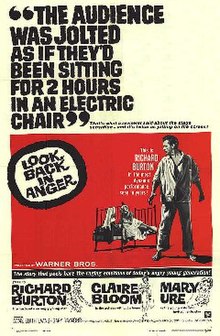Tony Richardson made a splashy solo directing debut with Look Back in Anger, a seminal British kitchen sink drama, starring Richard Burton, Claire Bloom and Mary Ure.
Grade: A- (**** out of *****)
| Look Back in Anger | |
|---|---|

Theatrical release poster
|
|
The film is based on John Osborne’s play about a love triangle involving a bitter disaffected working-class youngster Jimmy Porter, his upper-middle-class, impassive wife Alison, and her haughty best friend Helena.
The character of Ma Tanner, only referred to in the play, is brought to life in the film by Edith Evans as a dramatic device to emphasize the class difference between Jimmy and Alison.
Jimmy and Alison Porter, a young married couple, live in Midlands industrial town (Derby) in a shabby attic flat, which they share with Jimmy’s best friend and business partner, Cliff.
Despite graduating from university, Jimmy and Cliff make meagre living running a sweet-stall in the local market. Jimmy’s inability to climb the socioeconomic ladder, coupled with other injustices he sees around him make him angry at society and dominant culture.
He takes out his frustrations on his wife Alison, a submissive girl from an upper-middle-class family. Jimmy’s love for Alison is mixed with contempt–he feels she never had to experience want, pain, or suffering. He verbally abuses her; at one point telling her that he wishes she would have a child that would die. Unbeknownst to Jimmy, Alison is pregnant, and she herself has mixed feelings about the pregnancy and marriage.
Tensions heighten between the couple when Alison invites her assertive friend, Helena, whom Jimmy initially loathes, to temporarily stay with them.
After witnessing Jimmy’s treatment of Alison, Helena persuades Alison to leave Jimmy on the same day that Ma Tanner, who lent Jimmy money to set up his stall, has a fatal stroke. Eventually, Alison moves out and departs with her kind father, Colonel Redfern.
A grieving Jimmy returns to the flat to find Alison gone, and learns that she is pregnant. He starts an emotional tirade with Helena, who first slaps him but then kisses him passionately, and the two begin an affair. Months later, Jimmy and Helena have settled into comfortable relationship, but Jimmy is still hurt at Alison’s departure.
Living in her parents’ tranquil home, Alison fears that Jimmy’s wish for her to suffer tragedy might come true. Cliff decides to strike out on his own, and Jimmy and Helena see him off at the railway station.
After Cliff’s train departs, Jimmy and Helena see Alison sitting disconsolately in the station. Alison tells Helena that she has lost the baby and Helena, realizing her misconduct, informs Jimmy that she is leaving him.
In the end, Jimmy and Alison reconcile.
Saltzman and Richardson persuaded Richard Burton to take on the title role, at much lower fee ($125,000) than his Hollywood payoff.
The idea of hiring Nigel Kneale to extend the play into a workable script is credited to the influential theatre critic Kenneth Tynan, who had been in large part responsible for the incredible success of the play.
The part of the doctor was specially created for George Devine, the artistic director of the English Stage Company and the man to whom Osborne most owed his success. Glen Byam Shaw, Devine’s longtime collaborator (they created the Young Vic Company), was cast as Colonel Redfern. Two other members of the English Stage Company, Nigel Davenport and Alfred Lynch, were given small roles as commercial salesmen who try to pick up Alison and Helena in the railway station bar.
The Chris Barber jazz band appears in the opening scenes set at a jazz club.
Critical and Commercial Status
Though Burton was too old (35) and mature-looking for the part of Jimmy—who was meant to be in his 20s—he renders a multi-shaded powerful performance, especially in his scenes with Claire Blook, who’s superb.
Initially, the film was not commercially successful, partly because Westminster Council slapped it with the punitive X certificate due to language; and it did not help that it opened on May 29, 1959, during a severe London heatwave. But the positive reviews and favorable word-of-mouth, not to mention the launch of a new British film movement, catapulted the movie’s stature in later years, and it’s now considered to be a landmark (zeitgeist) picture.
The film was nominated in 4 categories for the 1959 BAFTA Awards: Best British Actor (Richard Burton), Best British Film, Best British Screenplay (Nigel Kneale) and Best Film. However, it won none, the winners being respectively Peter Sellers (I’m All Right Jack), Sapphire, Frank Harvey, John Boulting and Alan Hackney for I’m All Right Jack and Ben-Hur.
Burton was nominated for the 1959 Golden Globes, but the award went to Anthony Franciosa in Career.
Cast
Richard Burton as Jimmy Porter
Claire Bloom as Helena Charles
Mary Ure as Alison Porter
Edith Evans as Ma Tanner
Gary Raymond as Cliff Lewis
Glen Byam Shaw as Colonel Redfern
Phyllis Neilson-Terry as Mrs. Redfern
Donald Pleasence as Hurst, the market inspector
George Devine as Doctor
Walter Hudd as Actor
Nigel Davenport as 1st Commercial Traveller
Alfred Lynch as 2nd Commercial Traveller
Toke Townley as Spectacled Man
S. P. Kapoor as himself
Credits:
Directed by Tony Richardson
Written by Nigel Kneale, based on Look Back in Anger by John Osborne
Produced by Harry Saltzman, Gordon Scott
Cinematography Oswald Morris
Edited by Richard Best
Music by Chris Barber
Production companies: Woodfall Film, ABPC
Distributed by Warner
Release date: September 15, 1959
Running time: 98 minutes
Budget £250,000
Box office $1.1 million (US/ Canada rentals)










